'He totally gets the Gandhis...'
'If anything, he pays too much attention to the Gandhis.'
'I feel that in places like UP, where the Congress doesn't matter, he often spends time blasting the Gandhis.'
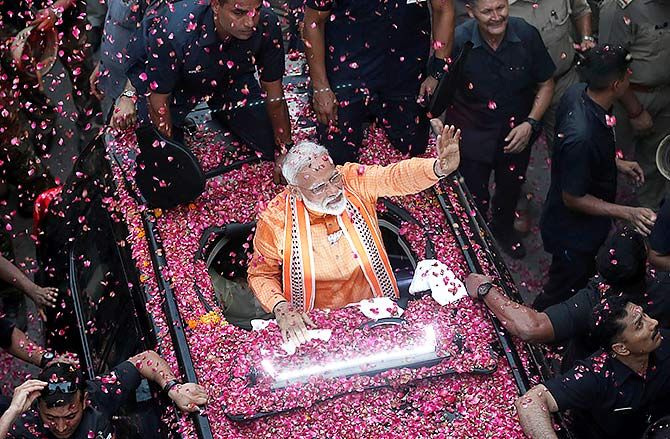
IMAGE: Prime Minister Narendra Damodardas Modi during a roadshow in Varanasi, April 25, 2019. Photograph: Adnan Abidi/Reuters
Ruchir Sharma is at this very moment in New York packing his bags for India.
Into those suitcases he will probably throw in pairs of sunglasses, stomach tablets, a range of hats, plenty of notebooks, anti-mosquito sprays, maps, maybe a camera, reading material, his passport, his India phone, a slew of the coolest cotton shirts. Perhaps no suits or ties.
Sharma is a senior global investor of a top investment firm, a columnist for The New York Times, The Times of India, The Wall Street Journal among others, and author, for whom travel to the freakiest places in the world, is par for the course, as he sniffs out new emerging markets.
But there is a destination that most definitely tops his list.
It has nothing to do with work.
India in Election Mode!
All set to fly to India in a few days to catch our country as she prepares to vote in the last two phases of the six-week 2019 Lok Sabha elections, Sharma has been covering India for 25 years running, right since the 1998 Uttar Pradesh state election, with a group of journalists and observers.
He has, over those years, clocked 25,000 miles plus -- more than the circumference of the earth -- crisscrossing India's heartland, from north to south and west to east (not all the way), as she hits the ballot boxes, to figure out the unique electoral pulse of her amazing people.
The spectacle of India deciding to vote, one of the most vivid juggernauts in the world, Sharma finds irresistible.
This investor, whose father hails from Rajasthan and mother from UP, grew up all over India since his father worked for the navy. But summers always brought him to his nana's house in Bijnor.
Sluggish Bijnor, in western UP, a town then of far less than a lakh population, and the place where Dalit leader Mayawati won her first election, was responsible for kindling Sharma's interest in politics.
As he tells Rediff.com's Vaihayasi Pande Daniel, UP is a state with a population of 204.2 million psephologists.
Every UP-ite is a budding Nate Silver, his ear keenly and zealously tuned in to every nuance or changing wavelength/fresh hawa of local politics.
Even during Sharma's days of yore, Bijnor's main chowks hummed with the excitement of electric political discussions.
In a pre-television, video, cellphone era, teenaged Sharma was often an eager bystander, quickly picking up an understanding of the complex intricacies and equations of the state's rough-and-tumble politics.
It was not a habit he was ever able to shake off and what drives him to return year after year to witness different editions of India's elections.
He has collated the best of his experiences in a recent book titled Democracy on the Road: A 25-year Journey Through India, his third.
Through 364 pages of Democracy on the Road, quite obviously a labour of love, Sharma offers nuggets about the wildest and sanest (are there any?) places he visited on the campaign trail, the food along the way, bytes with the most astute of voters and interviews with the biggest political stars.
More than that, he presents an intriguing, gorgeous portrait of an India he loves. The first of a multi-part interview:
Your book, which is largely about the elections, side by side, puts a finger on what is special about India. You mentioned warmth and India's ability as a country living on the edge of chaos to come out smiling.
As someone who has travelled all over the world on work, apart from your roots, what are the most attractive and exclusive characteristics of India?
What have the Indian people taught you?
Someone gave me a very good sort of analogy about this.
There is this instrument in an orchestra. It is called the oboe. The thing about this instrument is that it is a very key part of an orchestra. But you can never make out when the oboe is actually playing. It is one of those subtle, distinctive tones. It is very hard to make out what exactly is giving the orchestra such strength. But it is a very critical instrument.
For me that is what India is about. It is very hard to put your finger on the pulse (and figure out) what exactly it is about India that draws you back.
I guess it is the warmth. It's the hospitality. And it is the familiarity. I think three things.
Even though I am based in New York, I largely did my schooling and education in India. I grew up (here) and summer vacation was in India. As I mention in my book, at the outset, I spent a lot of my summer vacation in my mother's home, which I describe, is Bijnor out in the mofussil. Once you are part of that that milieu it sort of sucks you in.
And what have the Indian people taught you as you have roamed the countryside for 25 years?
The great thing about travel is that every place you go to you learn so much. You also learn about the different intensities about these places.
For example, when you go to Uttar Pradesh you figure out just how deeply involved they are in politics. The exact caste and community equation of every constituency is known to everybody. They will be able to speak to you like a psephologist in every place.
Places like (for instance) Karnataka when you go, you find much less passion about politics compared to what it is in UP.
When you travel the country what it tells you -- and this is one of the big themes of my book -- that this is truly a country of 29 different sub-nations.
The sub-national identities in India are very strong. For a lot of people that point is underappreciated. Either, because in India we live it on a daily basis. For the outside world that point, in particular, is really under appreciated.
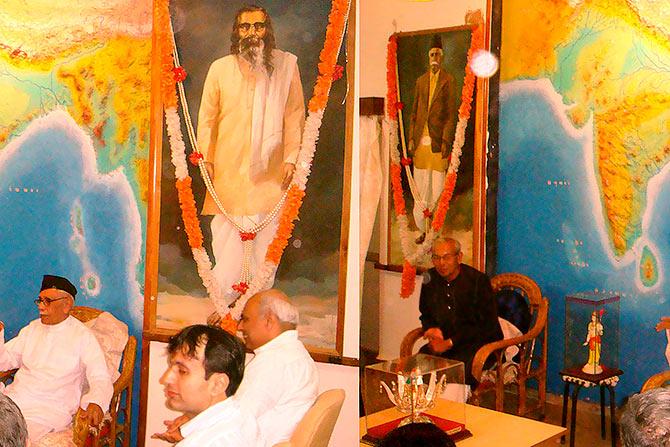
IMAGE: Ruchir Sharma with Rashtriya Swayamsevak Sangh leader M G Vaidya at the RSS headquarters in Nagpur. Photograph: Kind courtesy Ruchir Sharma via Penguin Random House India
In Democracy on the Road you several times refer to the maturing or rather non-maturing of India's electorate especially in reference to its tendency to vote out the incumbent ('Indian elections more often lost by the incumbent than won by the challenger') and not take economic progress as a plank to vote for.
At the same time you also marvel at the wisdom of the Indian people. How do you reconcile both these habits?
What is your overall assessment of Indian people as an electorate? Do you think the electorate is maturing?
I don't think anti-incumbency necessarily means that the voter is not mature.
Anti-incumbency has a lot to do with the fact that the state in India is broken, which is the fact that the capacity of the government to deliver on its promises is so limited in India; that it is very difficult to get any promises implemented in India.
Voters take their anger out at politicians at election time.
I don't think anti-incumbency has anything to do with voters not being mature. It is, in fact, that this is the one chance that voters have to take out their daily frustrations in life.
As I say, in India the life for the average person life is very oppressive because the government or the State machinery is either broken or it is oppressive -- whether it is the police or it is the other forces like the government bureaucrats.
The daily interface with government is very brutal, very difficult. So this is the one chance that the voter has to express their frustration when it comes to the polls, when it comes to elections.
So I don't there is a conflict between anti-incumbency and voter maturity. I think they go hand in hand.
I explain in the book that there was a phase in India from 2005 to 2010 when in fact most incumbents ended up getting re-elected.
That was because you had the ideal conditions in India. The economy was booming at 8 or 9 per cent. Inflation was virtually absent in that period. There was a big revenue windfall coming from external sources because of the global boom.
The big revenue windfall was coming to the government because there was very fast growth and they were able to spend a lot on welfare. Whether it was from the central government or the state government, a lot was spent on welfare.
This amazing combination of things that happened, lead to the so-called anti-incumbency dissipating in those years in the last decade...
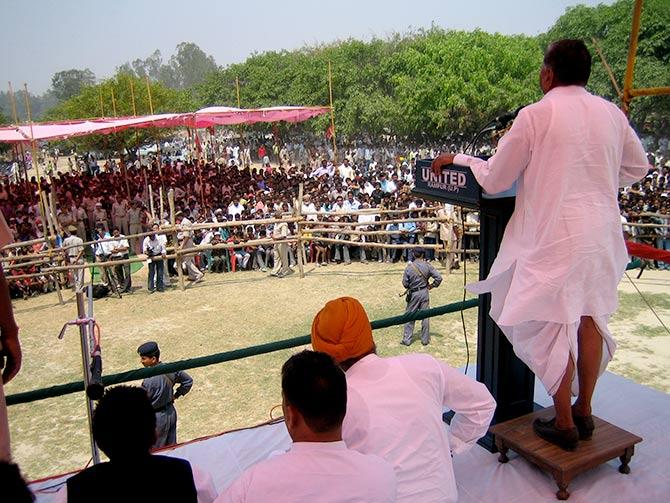
IMAGE: Samajwadi Party President Mulayam Singh Yadav stands on a stool at a rally in Seohora in 2007. Photograph: Kind courtesy Ruchir Sharma via Penguin Random House India
You seem to have met all the big stars in the political firmament. May I know who were the politicians who made the most impact on you? And the reasons for your choices?
Who was the most eloquent? Who was most charming? The most intelligent? The most erudite?
At the end of the day, when you meet the politicians you end up feeling quite good about them, right? Feel very good about them...
We have a cynical impression sitting in Delhi or outside (of India) that a lot of these politicians are out only to make money. Only out for themselves.
When you meet them, on the campaign trail, some of these leaders, you really figure out, that their commitment is deeper than you think. That's the overall impression.
Specifically, I think, that different people have very different personalities.
One thing in India I find fascinating is that how few politicians are very good orators or very eloquent.
Narendra (Damodardas) Modi is one of the best orators in the world. And we have heard him multiple times on the stump...
On the other hand it is amazing how many of these regional leaders are not good orators -- whether it is Mayawati or Mulayam Singh Yadav (former chief ministers of Uttar Pradesh). Or even people like (Andhra Pradesh Chief Minister Nara) Chandrababu Naidu or (former prime minister H D) Deve Gowda. So many of these regional leaders are just very poor orators.
One of the remarkable features of Indian democracy is that you don't need good oratory skills it seems to win. If you have, like Modi does, obviously it is a big advantage.
Many of these regional leaders don't just care what their oratory skills are. Jayalalithaa (the late Tamil Nadu CM) even. Yet they are able to win elections. That's quite amazing.
At a personal level, most of these politicians know exactly how to charm you. When you meet them, at a personal level, they shower attention, they are very hospitable, know how to charm you. They are people's people.
Narendra (Damodardas) Modi is a great orator, but he has a very no nonsense approach. When you meet him, it is basically very intense and focused.
Someone like (Congress President) Rahul Gandhi used to come across as very academic and abstract in terms of his interactions and what he is telling you and what he is doing.
(Politician) Priyanka (Gandhi Vadra) comes across as someone who is having much more fun with the game.
Sonia (Gandhi, United Progress Alliance chairperson) is possibly the most reclusive politician we have met. It is very hard for her to spend time of more than 10 to 15 minutes. She is just uncomfortable spending too much time with anyone.
Then you have other people like Lalu Prasad Yadav (former Bihar chief minister) who are very witty and playful. Or you have people like Nitish Kumar (present Bihar CM) who are very hospitable.
One of my favourite anecdotes in the book is about a trip to Bihar we made in 2010 where we went to Patna to cover the state elections in October 2010.
We basically had three meals (in one evening) and we couldn't say no to anybody. First, Lalu Prasad Yadav was feeding us his singharas, really big samosas. And then you have someone like Nitish Kumar.
When you go to meet him, whole plates come out of cutlets and pakoras. You have to eat them because you can't tell him you just ate at Lalu's place.
And then (we were) at (now Union minister) Ravi Shankar Prasad's place and he was serving you litti chokha that is a very Bihari specialty. He has made it especially for dinner, so you have to eat it.
So it was one of those crazy evenings. But it just tells you about the warmth and the way that food is the code of love. You need to accept and please the host by accepting whatever they give you.
I would say that's what also goes back to your first question: This is what brings you back to India. This kind of hospitality and warmth you will not see offered to you on campaign trails, no matter who you are, in other countries.
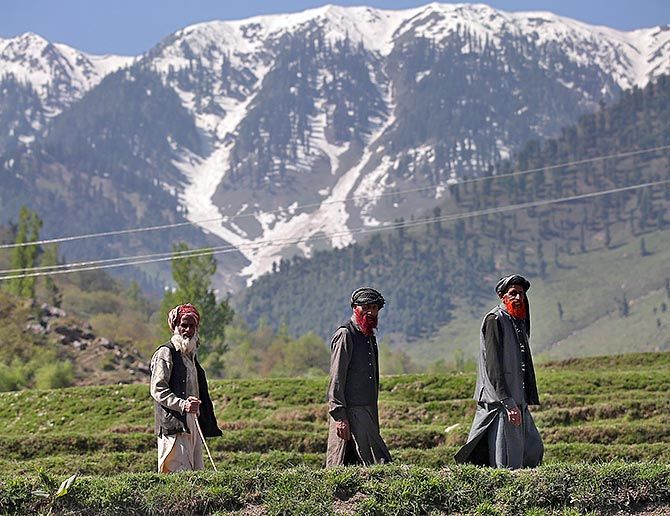
IMAGE: Voters walk to cast their votes in south Kashmir's Anantnag district, April 2019. Photograph: Danish Ismail/Reuters
I know it is hard to choose. But anyone who stands out for being more memorable either in a negative way or a positive way?
Very hard to choose. Each one has their own unique character. As I said Modi is very no nonsense and Lalu is at the other end...
Some of the leaders I have missed. I started out (covering them) when some of them were at the fag end of their career. Like (late prime minister) Atal Bihari Vajpayee. I wish I had spent more time with him on the campaign trail because I have heard him speak. He is a masterful orator. Haven't really spent much time with him.
When I was young and naïve, (late prime minister) Rajiv Gandhi was this person who came across as the very suave politician. Obviously, I was too young to have any access to him back then. That was something we missed.
In the current generation of leaders I have been fortunate to have met practically everybody.
The one person I have missed, in the current generation, and I have not been able to spend much time with is: (Four-time Odisha CM) Naveen Patnaik.
Odisha is one state where we just haven't been on our election trail somehow. So it's been missed. He is one person of the current generation that I have missed interacting with.
The occasions for you to meet Modi were limited for various reasons. Would you have wanted to spend much more time meeting him? Or do you think those interactions, given the person he is, were sufficient to understand a lot about him? And you are not going to get much more than what you have seen already?
We would be happy to interact. But I think he is generally sceptical of interacting with the English media.
We are happy to meet leaders, but I feel that, over time, he has become extremely sceptical of these kinds of interactions and, as I mention in the book, some people in the group have had a contentious experience with him, in terms of their interactions, so that it is the issue.
Do you feel Modi is a very opaque man and very hard to get through to in an interview?
Yes.
(Laughs) But he is the prime minister now, so it is very hard to get through to him...
We met Amit (Anilchandra) Shah more recently... I think it is very different as far as he is concerned because I think over time he has grown -- he was always sceptical -- but he has gotten extremely sceptical of the English media.
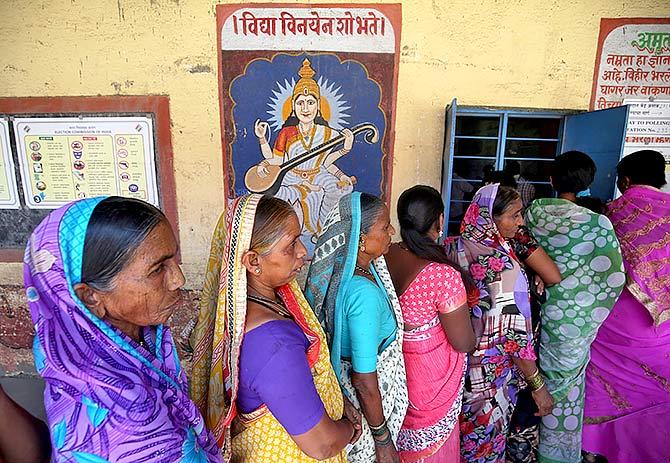
IMAGE: Women wait at a polling station on the outskirts of Pune, April 23, 2019. Photograph: Francis Mascarenhas/Reuters
What is it that Modi does not get or understand about the Gandhis (and their popularity)?
I think he totally gets the Gandhis...
If anything, he pays too much attention to the Gandhis. I feel that in places like UP, where the Congress doesn't matter, he often spends time blasting the Gandhis.
I don't think the issue is he doesn't get the Gandhis. He understands the role of the Gandhis and he obviously has a very negative take on it which is fine.
That's his political view... The Gandhis are very much in his crosshairs.
Modi keeps asking at rallies these days if India is in safe hands. In Modi's hands, is India in safe hands, do you feel, now that you are once again on the road?
I would like to stick to what's in the book... Generally my impression of Indian leaders has gone up over time.
When I see them on the campaign trail, I see the expectations out of them, I see what is going on. I think India is generally in safe hands... I don't think there is anyone (about whom) I would say to that 'Oh India is not in safe hands'. That for me is too strong a statement...
It is his campaign slogan and understandably --- a slogan on national security.





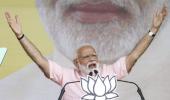
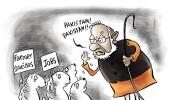









 © 2025
© 2025